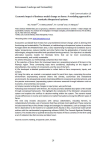Fatahi N.-E., Belhouchette H., Pinto Correia T., Marques J.T. (2023). Economic impact of business model change on farms: a modeling approach in montado silvopastoral systems. In : Laranjo M. (ed.), Alexandre A. (ed.), Medronho B. (ed.), Eufrázio S. (ed.), Marques C. (ed.), Pinto Correia T. (ed.). VIII PhD students meeting in environment and agriculture: book of abstracts.
Évora (Portugal) : Universidade de Évora.
p. 29.
8. PhD Students Meeting in Environment and Agriculture, 2023/12/11-12, Évora (Portugal). Oral Communication 10.
https://www.med.uevora.pt/wp-content/uploads/2024/01/Book-of-Abstracts_VIII-EEDAA_2023_ISBN.pdf
https://www.med.uevora.pt/wp-content/uploads/2024/01/Book-of-Abstracts_VIII-EEDAA_2023_ISBN.pdf
| Titre : | Economic impact of business model change on farms: a modeling approach in montado silvopastoral systems |
| in : | |
| Auteurs : | N.-E. Fatahi ; H. Belhouchette ; T. Pinto Correia ; J.T. Marques |
| Type de document : | Communication à un Congrès (avec Actes) |
| Editeur : | Évora [Portugal] : Universidade de Évora, 2023 |
| Format : | p. 29 |
| Note générale : | Oral Communication 10 |
| Langues : | Anglais |
| Langues du résumé : | Anglais |
| Catégories : |
Catégories principales 06 - AGRICULTURE. FORÊTS. PÊCHES ; 6.5 - Gestion des ExploitationsThésaurus IAMM IMPACT ECONOMIQUE ; ADAPTATION AU CHANGEMENT ; CHANGEMENT CLIMATIQUE ; EXPLOITATION AGRICOLE ; MODELE ECONOMIQUE ; STRATEGIE DE L'ENTREPRISE ; SYSTEME AGROSYLVOPASTORAL ; DURABILITE ; PORTUGAL |
| Résumé : |
Ecosystems worldwide face threats from unprecedented climate change, which is altering their functioning and sustainability. The Montado, a traditional agro-silvopastoral system in southern Portugal within the Mediterranean area, is also experiencing increasing arid conditions due to higher temperatures, reduced rainfall, and other factors like the globalization of markets and technologies, alongside intensified and specialized farming practices. Our objective is to identify alternative business models for Montado farms that can be more economically, environmentally, and socially sustainable. To achieve this goal, our methodology comprised four main steps:
i) The selection of three farms for interviews based on a preexisting network of farmers in the Alentejo region. Three contrasting types were considered, depending on the degree of intensification, the number of components, and the size of the farm. ii) We developed a detailed questionnaire to collect data on farm components, inputs, and outputs. iii) Using this data, we created a conceptual model for each farm type, comprising the active environment (representing external drivers like climate, economical and institutional environment), the silvopastoral system (illustrating different components and interactions), and the passive environment (representing system outcomes assessed through indicators such as economic, environmental, and social). iv) Simple scenario testing like changes in input prices, was performed. Following close interaction with farmers, the results provide a detailed description of the model through conceptual frameworks. This highlights the complexity of the Montado's silvopastoral system and explains the conflicts in decision-making within the system. The scenario tested reveals differences in income and resilience to market fluctuations among the different types of farms. The next step involves discussions with various stakeholders, including farmers, to collaboratively formulate a set of scenarios that they estimate most significant. These scenarios include external factors like climate change and strategies for adaptation, such as changes in the farm's dependence to the market or in subsidies levels. Based on this, a numerical model will be written with the mathematical programming software GAMS (The General Algebraic Modeling System). This model aims to quantify and assess the impact of these scenarios on the farm using a set of indicators like farm income and labor hours. |
| Cote : | Online |
| URL / DOI : | https://www.med.uevora.pt/wp-content/uploads/2024/01/Book-of-Abstracts_VIII-EEDAA_2023_ISBN.pdf |
Documents numériques (1)
PRO51207.pdf Adobe Acrobat PDF |







